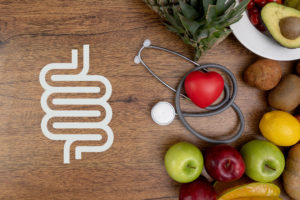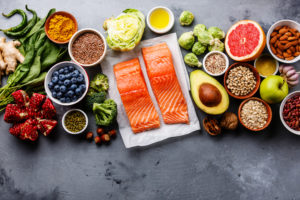
These days, digestive health problems have become not only a regular topic of conversation, but they’ve also ballooned into a billion-dollar industry of over-the-counter remedies.
Modern-day society often demands we work harder and longer, spending more time away from home than ever before.
Unfortunately, this means many people have thrown in the towel on things like healthy eating habits and regular exercise.
Digestive woes may present themselves in a variety of ailments such as diarrhea, constipation, IBS (Irritable bowel syndrome) IBD (Inflammatory bowel disease), and heartburn.
Many of these maladies are caused by consuming too many preservatives, not drinking enough water, stress, not enough roughage, a sedentary lifestyle, poor nutrition, food sensitivity and, even reoccurring infections.
The good news is that diet and lifestyle changes can have a positive effect on your gut health.
Here are 10 proven ways to naturally improve your digestive health:
Eat Real Food
The typical Western diet is high in refined carbs, saturated fat, food additives, and preservatives, all of which have been linked to chronic digestive disorders.
Fast foods are high in salt, sugar, processed oils and don’t provide much nutritional value.

Avoid artificial sweeteners and other ingredients formulated to fake out your taste buds. Eat a diet of whole, fresh foods and limit the processed foods on your table.
RELATED: The Best Foods For Your Digestion
Stay Hydrated
Drinking plenty of water is essential to good health.
'We hear it all the time, but sadly, many of us don’t heed that advice. Insufficient fluid intake is a common cause of constipation.
In addition to water, you can also meet your fluid intake with non-caffeinated beverages such as seltzer water, fruit-infused water, and tea.
Peppermint, fennel, ginger root, and fenugreek teas also have great digestive benefits.
RELATED: 4 Drinks That Help You Digest Food
Another excellent way to meet your hydration needs is to include lots of fruits and vegetables that have a high-water content such as cucumbers, zucchini, tomatoes, melons, strawberries, peaches, grapefruits, and celery.
Remember, alcoholic drinks dehydrate your body, so, that celery in your Bloody Mary cocktail won’t be of any help.
Probiotics Promote Healthy Bacteria
Healthy bacteria assist in digestion by breaking down indigestible fibers that cause gas, pain, and bloating.
Probiotics are beneficial bacteria that improve digestive health -- even as supplements.
Studies have shown that symptoms of bloating, gas, and pain in people with IBS is greatly improved with the addition of fermented foods such as kimchi, sauerkraut, miso, and yogurts with live, active cultures.
You can also improve your digestion by ensuring that your body gets enough probiotics, glutamine, and zinc.
Manage Stress
Not only does stress negatively impact your mind, but it can also impact your digestive health.
There are many simple, yet effective, methods of managing stress.
Walking, meditation, deep breathing, yoga and swimming are among the easiest and most available to everyone.
Chewing Properly
Good digestion starts in your mouth.
You have to start chewing your food properly. It eases the work your digestive system has to do. Pretty simple, huh?
Get Plenty of Fiber
Leafy greens such as spinach and kale are excellent sources of fiber as well as nutrients like folate, vitamins K, and C.
They also contain a specific type of sugar that helps fuel growth in healthy gut bacteria. Green smoothies or juice are also a delightful way to drink your fiber.
RELATED: 7 Good Things That Will Happen To Your Body When You Eat More Fiber Daily
Lean Protein Is Best
People with bowel sensitivity or IBS should stick with eating lean meats and avoid foods that are high in fat, especially fried foods.
High-fat foods can trigger contractions of the colon. Red meat and fatty foods can also promote problematic colon bacteria.
Reset With a Digestive Health Detox
A gentle detox on a regular basis is a great way to reset your entire digestive system. Avoid any detox plans that are based on drastic food deprivation or include liquids only.
Try cleaning out your digestive system by eliminating everything but fibrous fruits and vegetables from your diet for a few days.
The top detoxing vegetables are cruciferous vegetables like broccoli, spinach, kale, asparagus, boy chow, watercress, radish, cauliflower, and artichoke.
Avocado, tomato, watermelon, guava, and berries are the best fruits. Never go over 10 days!
Get On UP And Move
Inactivity is the enemy of healthy digestion. Research has shown that those who exercise regularly have better gut transit time between eating and eliminating.

At least 30 minutes of walking or regular exercise is great. Yoga, swimming, and, stretching are also beneficial.
Talk to Your Doctor
Always discuss any digestive problems or pains with your physician to make sure you understand the source of your discomfort.







